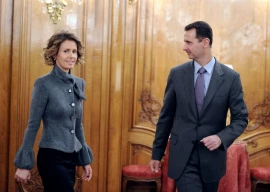
The ongoing United Nations climate conference in Cancun, Mexico, offers an opportunity to take an important step forward — and we must seize this moment together. The United States is committed to working with Pakistan and our other international partners to meet this great global challenge.
At Cancun, we must build on the progress made last year in Copenhagen and move forward on all key elements of the negotiations — mitigation of emissions, transparency of actions, financing, adaptation and technology. As part of the Copenhagen Accord, for the first time all major economies committed to take actions to limit their emissions in an internationally transparent manner. The agreement also includes landmark provisions for financial assistance to support clean technology development, adaptation and forest protection in those countries most in need. These provisions consist of a pledge for a ‘fast start’ funding by developed countries, approaching $30 billion over the years 2010-2012.
The United States is delivering on our fast start commitment. This year alone, the United States has significantly increased its climate finance funding to a total of $1.7 billion. Evidence of this progress can be seen in Pakistan.
For example, we are providing $2.1 million (Rs78.5 million) to promote market-based, modern biomass energy conversion technologies for power generation in rural areas in this country.
But our commitment to help Pakistan meet its energy and environmental needs goes further. The US Agency for International Development (USAID) is funding rehabilitation of the Tarbela hydropower plant to generate electricity for approximately 150,000 homes. As part of Kerry-Lugar-Berman assistance, USAID is also investing $66 million (Rs5.6 billion) to support the completion of two multi-purpose dams that will produce hydropower, control flooding and store water for irrigation. The dam in South Waziristan will electrify approximately 25,000 households and will mitigate potential flood damage. The dam in the Gilgit-Baltistan area will reduce loadshedding to approximately 280,000 people in Skardu and provide more than 11 million litres of potable water per day.
The governments of the United States and Pakistan, together with the American power company AES Corporation, recently signed a public-private partnership agreement to develop a $375 million (Rs32 billion) wind power generation project in the Gharo Corridor of Pakistan. The project will produce 150 megawatts of new, ‘clean’ power, serving some 600,000 homes and reduce Pakistan’s dependence on imported fuel, saving Pakistani citizens $45 million (Rs3.8 billion) per year.
These projects are all manifestations of the vital partnership between the United States and Pakistan — one that benefits the everyday lives of Pakistani citizens.
The United States is also working hard to reduce its own emissions and transition to a clean energy economy. President Barack Obama’s Recovery Act provided more than $80 billion in investments, loans and incentives to support a range of initiatives that are vital to this goal. We have put in place the most ambitious US automotive fuel economy and emission standards ever. And President Obama continues to work with Congress to pass domestic energy and climate legislation.
As I travel throughout Pakistan, I see broad concern about the impacts of climate change, particularly increased flooding. But I am encouraged by the actions that are being taken here and around the world to work towards a clean energy future.
Just as no nation can escape the effects of climate change, no nation, alone, can solve this problem. The United States is committed to working with Pakistan and other partners to build a sustainable, clean energy economy that will lift people out of poverty, deliver energy to people who need it and preserve the environment. The Copenhagen Accord and the current climate change meeting in Cancun are important steps in our collective commitment to build a healthier and more prosperous planet for all.
Published in The Express Tribune, December 3rd, 2010.












1734899716-0/image-(15)1734899716-0-270x192.webp)






COMMENTS (10)
Comments are moderated and generally will be posted if they are on-topic and not abusive.
For more information, please see our Comments FAQ